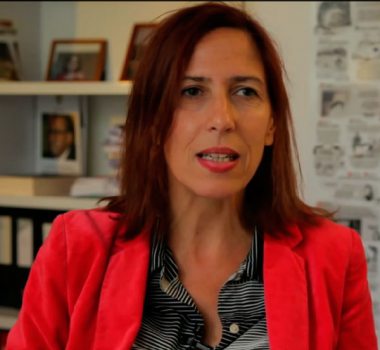International human rights defenders: Belarusian dictator openly supports the death penalty: the only hope is for the civil society (videos)
-

- Florence Bellivier, Chairperson of the World Coalition Against the Death Penalty and the vice-president of FIDH
Chairperson of the World Coalition Against the Death Penalty Florence Bellivier and FIDH President Karime Lahidji video addresses on the occasion of the Week against the Death Penalty in Belarus. According to the international human rights activists, the positive developments in the issue of the death penalty in our country are only possible thanks to the efforts of the civil society and international mobilization.
Karime Lahidji, President of the International Federation for Human Rights (FIDH), in his address said that the Federation, which has affiliates in 120 countries, has consistently called on the government and the States that have not yet abolished the death penalty, to fulfill the UN resolution moratorium as the first step. These countries include Belarus, where, as he emphasizes, human rights defenders and activists are sometimes prosecuted in connection with the activities aimed at the abolition of the death penalty.
According Florence Bellivier, Chairperson of the World Coalition Against the Death Penalty and the vice-president of FIDH, everyone who is even slightly interested in the problem of the death penalty knows that Belarus is the only country in Europe which still has the death penalty in its legal arsenal apply it in practice, contrary to international law.
"Belarus is a dictatorship, and theruling dictator speaks clearly and openly in favor of retaining the death penalty. In this situation, only national and international mobilization can help to achieve at least compliance with international legal standards in making and enforcement of sentences. With regard to the national mobilization, we are lucky that Belarus has a very active civil society,” notes Florence Bellivier. “There is no use to condemn Belarus, as the Belarusian authorities are totally indifferent to condemnation of the international instances. However, if this question is put on the agenda in all international and European negotiations, then we can hope that in a few years the death penalty will be canceled in this country will be canceled."
Reference
The World Coalition Against the Death Penalty was established in 2002 and consists of more than 150 non-governmental organizations, bar associations, local authorities and trade unions, including international human rights organizations such as Amnesty International, Human Rights Watch, Penal Reform International, FIDH. The Coalition is committed to strengthening the international dimension of the fight against the death penalty, with the ultimate goal of the abolition of this form of punishment around the world. In 2003, the Coalition has put into the human rights calendar the World Day Against the Death Penalty, which is celebrated annually on 10 October.

